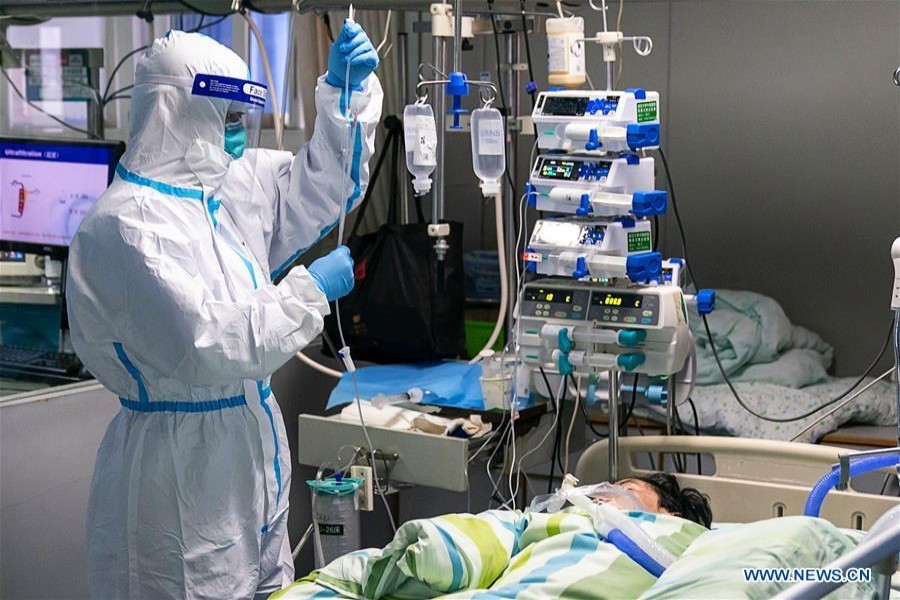The outbreak of the novel coronavirus in an epidemic form in China is giving a nightmarish time not only to that most populous country on the planet but also to the rest of the nations. Already patients infected with the virus have been found in 25 other countries worldwide. The epidemic defies containment even after widespread lockdown immediately after its first detection in the Chinese city of Wuhan and rapid spread in that country. A contagious disease, it has already proved deadlier than the Severe Acute Respiratory Syndrome (SARS) that broke out widely in 2003.
The World Health Organisation (WHO) was forced to declare a global health emergency earlier. Now that the toll of the virus is increasing ever higher along with greater number of people getting infected with every passing day, there unfolds a frightening spectre. It is all because, no vaccine could be invented yet as an antidote against the virus. The death toll in China has surpassed the 1,300 mark by Wednesday and the central Hubei province reported 242 deaths on that day alone. By that time the number of the affected rose to 60,000. However, experts predicted the high incidence of infection dropping by mid-Februrary.
The enormity of the threat in that country and all across the globe prompted the WHO to arrange a two-day international meeting in Geneva, in which about 400 scientists participated. WHO director general Tedros Adhanom Ghebreyesus at the start of the meeting admitted that China is indeed encountering an emergency with 99 per cent cases of coronavirus attacks but the rest of the world is also facing a grave threat. Prof. Gabriel Leung, the head of public health medicine at Hong Kong University issues a dire warning. He predicts that two-thirds of the global population may catch the virus if it could not be controlled soon. According to the reckoning of health experts each person infected is likely to transmit the virus to 2.5 other people. This gives an attack rate of 60-80 per cent.
However, the eminent Hong Kong epidemiologist is not a doomsayer as he expresses his optimism by questioning if 60-80 per cent of the world population is going to get infected. His counterargument is in favour of not happening anything like this. Instead, 'maybe the virus is going to attenuate its lethality because it doesn't help if it kills everybody in its path, because it will get killed as well". This is a positive note.
While his expert opinion is comforting enough, people, however, would like to know how and when this will happen. The overriding concern is, when the virus will get killed or at least be tamed by vaccine or any other remedy. Doctors in Thailand were reported to have successfully treated a patient with a triple cocktail of anti-viral, flu and HIV medication. But little is known about its follow-up. One hopes it was not a publicity stunt. If such a cocktail was a sure cure, doctors could apply the same for saving patients infected with the deadly virus or scientists could come up with a simpler and cheaper version of medicine depending on the properties of the cocktail.
That medical science has prevailed on newer types of viruses every time is a proven fact. But with random abuse of antibiotics, germs have developed newer strains as well rendering the medicines' therapeutic properties ineffective. Today medical scientists are facing a far greater challenge than before to come up with the right type of cure for some diseases caused by unfamiliar viruses or newer strains of existing viruses. This has been further complicated by biological research in germ warfare. Creation of newer germs in laboratory to be used against enemies in war has opened up the floodgates of the possibility of annihilation of the entire human race.
Indeed, human progress has been possible on scientific knowledge and its application in the form of technology, infrastructure, commodities of comfort and luxury and even foods. But at the same time the misuse of the knowledge has invited danger and doom for the mankind. In the case of coronavirus, the WHO would like to find an answer to its source and how it gets transmitted so fast. The sooner it is found the better.
The fallout of the outbreak of the virus is highly damaging. In countries not so developed in medical science if the virus continues to stalk like it does in the second richest country of the world, it will leave a trail of death unforeseen before. In terms of trade and development works too, the world is either suffering or incurring losses. If the virus somehow invades such countries with little defence against epidemics, the scale of death and devastation will be unmanageable. Let the scientists present at the WHO meeting at Geneva find out a routine formula apart from the lockdown as a public health intervention so that normal life does not come to a standstill anywhere. The best solution, of course, is to find a medical invention that gives immunity to people not yet infected.


